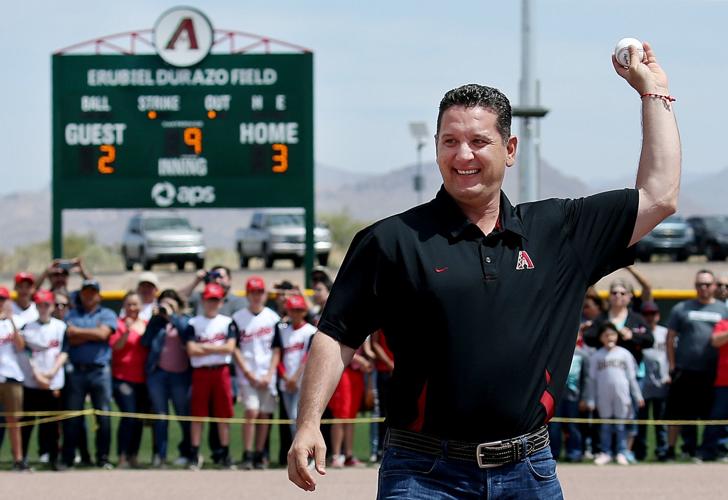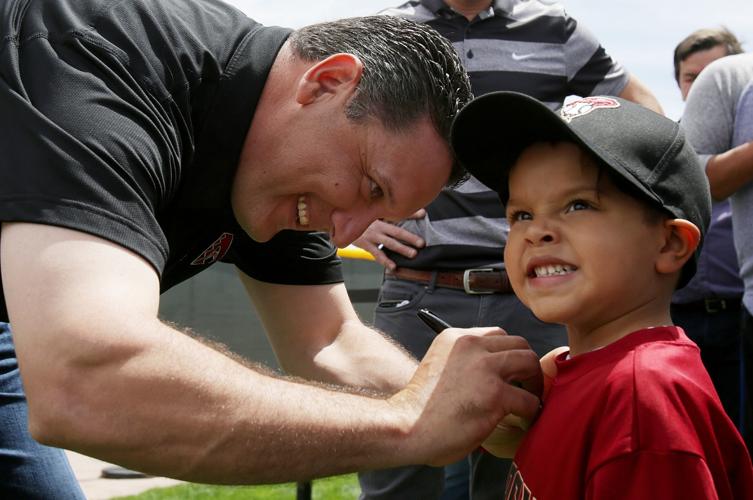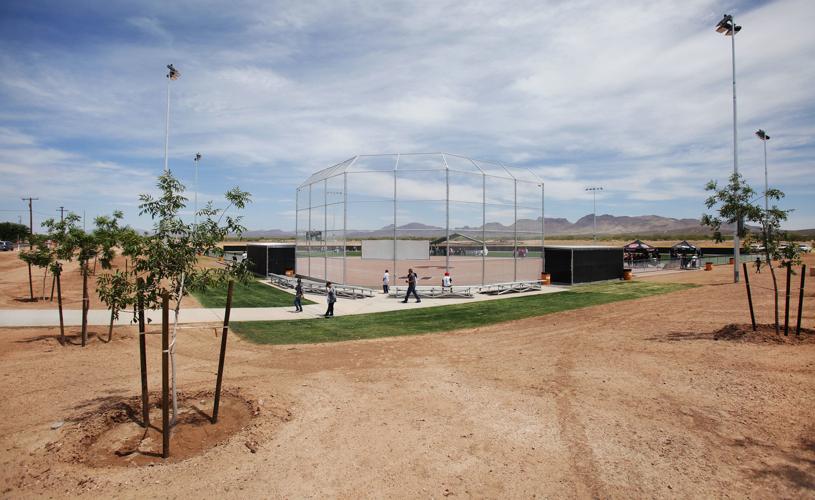DOUGLAS
In the spring of 1993, Amphitheater High School was ranked No. 1 of all the high school baseball teams in the United States. What’s that, No. 1 out of 10,000 teams?
“You’ve got to come and see my pitcher, Erubiel Durazo,” said Amphi coach Danny Hernandez. “He’s starting tomorrow against CDO.”
A day later, suitably jinxed, the 15-0 Amphi Panthers lost to CDO and Durazo was the losing pitcher. But it wasn’t his pitching that stood out; it was the way he swung the bat.
“Nobody’s recruiting him,” said Hernandez. “It’s crazy.”
From Amphi, Durazo went to Pima College and hit .434 over two seasons. Strangely, nobody drafted the 6-foot 3-inch lefty from Hermosillo, Sonora. After four years in Tucson, he moved back to Mexico and started to work at his father’s cattle ranch.
Baseball career? He got a $200-a-month tryout with Zacatecas, the equivalent of what used to be a Class D team in America.
So you might imagine the emotions Durazo felt Tuesday morning when about 1,000 people from Douglas and Agua Prieta drove to East Geromino Trail and found that all of the available parking spots at Airport Park were occupied.
All of them had come to watch the dedication of Erubiel Durazo Field.
Durazo spoke in Spanish when it was his turn at the podium, but a loose translation was “sometimes I find it hard to believe I’m here.”
Arizona Diamondbacks president Derrick Hall chartered a small jet from Phoenix to Douglas early Tuesday, and Durazo, 43, was prized cargo.
For the 40th time in franchise history, the Diamondbacks built (or refurbished) a baseball or softball field in this state, spending more than $10 million in the process. They had previous dedications everywhere from Buckeye to Show Low to Sacaton, and each time named a field after one of their enduring ballplayers, like Randy Johnson and Curt Schilling.
Thirteen years ago the Diamondbacks dedicated Elmer Dessens Field for the Amphitheater Little League at Jacobs Park, just down the road from where Durazo made his American debut in 1993 as an Amphi transfer student with three other members of the Mexican Junior National team: Efrain Acosta, Hector Maytorena and Rolando Nichols.
Hall, who has been present at most of the 40 field dedications, saw the natural fit between Douglas and Durazo, whose family ranch in Bacadehuachi, Sonora, is only 75 miles south of the new Erubiel Durazo Field.
“I played in Douglas as a kid,” Durazo said. “It’s such an honor to be back here for a day like this.”
Said Hall: “This never gets old — 40 of these fields — it’s hard to believe. But to have the right guy’s name on the scoreboard really makes this special.”
Durazo, who was hired by the Diamondbacks two years ago essentially to be an ambassador to Mexico and a link to the club’s robust Spanish-language audience, experienced a Cinderella-type rise from his small-scale minor league team in Zacatecas to an unforgettable role during the Diamondbacks’ run to the 2001 World Series championship.
Unforgettable?
Douglas mayor Robert Uribe, who was living in New York City during the epic seven-game 2001 World Series between the Yankees and Diamondbacks, said he was such a Yankees fan that Durazo’s tie-breaking double in Game 4 “made me cry.”
“But today,” said Uribe, wearing a Diamondbacks jersey, “I cry tears of joy.”
Uribe and his staff worked diligently through the D-Backs grant process, ultimately meeting all qualifications. Erubiel Durazo Field has state-of-the-art LED lighting, a new scoreboard, turf, fencing and irrigation.
Durazo’s baseball name will endure forever not just in Douglas, but in Tucson.
After four remarkable seasons at Amphi and Pima College, he got the break of a lifetime while playing for manager Derek Bryant of the Monterrey Sultans. When the Diamondbacks hired Bryant as a manger of a single-A minor-league team, he told them about Durazo.
Intrigued, the Diamondbacks signed him to a minor-league contract just before Christmas, 1998, and assigned him to Double-A El Paso. That’s when the story crossed into pinch-yourself-it’s-true territory.
Durazo was so good so soon at El Paso, hitting .403 with 14 home runs in just 64 games, that he was promoted to the Triple-A Tucson Sidewinders. When he arrived back in Tucson, he had a mouthful of braces.
Durazo was the most shy ballplayer in the clubhouse.
And then he really caught baseball’s attention by hitting .406 with 10 homers in just 30 games as a Sidewinder. Tucson manager Chris Speier joked that Durazo was “hitting .8,000.” The Diamondbacks, who had just paid $10 million for first baseman Travis Lee, had no choice but to summon Durazo to the major-leagues.
How’d it work out?
Let’s just say that two years later, in the NLCS against the Atlanta Braves, Durazo hit a two-run homer off future Hall of Famer Tom Glavine to secure Arizona’s berth in the World Series.
On Tuesday, Durazo signed autographs for what seemed like forever, chatting quietly, in Spanish and English, modest as always.
“People see that I haven’t changed as a person,” he said.
In his seven years in the big leagues, Durazo hit 94 home runs.
On Tuesday, he hit No. 95.






